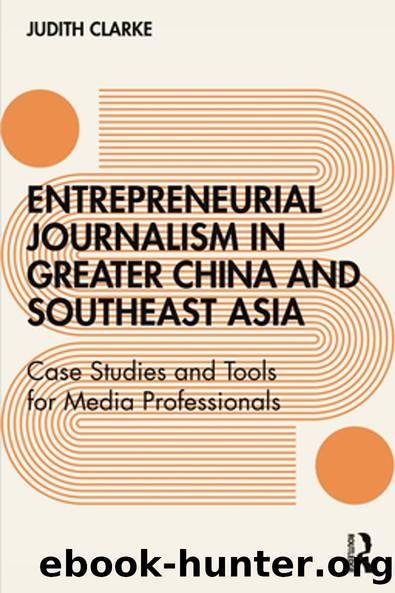Entrepreneurial journalism in greater China and Southeast Asia by Judith Clarke

Author:Judith Clarke [Clarke, Judith]
Language: eng
Format: epub
ISBN: 9781138283091
Barnesnoble:
Goodreads: 34628042
Publisher: Routledge
Published: 2021-11-17T00:00:00+00:00
THE PHILIPPINES
Bulatlat
One of the first online news outlets in the Philippines, Manila-based Bulatlat was founded in 2001 in the wake of the countryâs second âpeople powerâ revolution, which ousted the corrupt president Joseph Estrada. Its name is carefully chosen, but it has no equivalent in English: âbulatlatâ refers to a search through a crammed container where you carefully remove all the objects inside until you find what youâre looking for. Bulatlatâs job, according to its site, is to âdig out facts buried by censorship and corruption and lay them out for public scrutiny, without fear or favorâ. An alternative nonprofit outfit, it uses its journalism to support civil society rather than make money. âIt is our sense of advocacy to disseminate information to the publicâ, says its associate editor Danilo Arao. âThatâs why many people believe in us.â
FIGURE 7.3â Danilo Arao. Supplied by Danila Arao.
Yet even in the Philippines few readers of regular news know about Bulatlat. For one thing, says Arao, itâs a small publication with limited resources and it has nothing like the reach of the high-profile for-profit startup Rappler. But the main reason is that it reaches a very different audience. âThe people who support us are most especially from the marginal sectors of society â the striking workers, the farmers, the indigenous peoplesâ, Arao says. âIf you are poor and you come from remote areas, most probably youâve heard of Bulatlat because we go there and we tell their stories, so thatâs how they learn about us.â
Arao insists that Bulatlat isnât a business. Itâs registered as an NGO under the umbrella of its publisher, the Alipato Media Center, and is not concerned about the bottom line. âRappler, itâs an open secret, makes money, but in our case we donâtâ, he says. With Bulatlat, the whole point is to do journalism that helps people. Yet despite its lack of commercial base, Bulatlat has survived for 20 years and is still going strong. It has a solid editorial team, a sophisticated website that is regularly replenished, a daily newsletter and updated social media. This must have taken at least a little business acumen.
The key to Bulatlatâs ability to continue as a going concern, says Arao, is keeping costs down and relying on goodwill and â most of all â passion. Bulatlat takes its cue from Philippine national heroes Jose Rizal and Marcelo del Pilar, who produced the independence movementâs newspaper La Solidaridad for several years in the late 19th century. Bulatlatâs main saving is on staff salaries: it doesnât pay any. âIf you look at journalism as a career, ⦠that would be unfairâ, says Arao. âBut if you look at journalism as a commitment, I think it makes sense because we have people who are willing to do work out of their love for the profession.â He notes that Rizal and del Pilar took no payment for their work and even put their own money into their newspaper.
Most who work at Bulatlat are lifelong activists. They are inspired by the outletâs philosophy and are keen to produce progressive journalism.
Download
This site does not store any files on its server. We only index and link to content provided by other sites. Please contact the content providers to delete copyright contents if any and email us, we'll remove relevant links or contents immediately.
Spell It Out by David Crystal(35861)
Life for Me Ain't Been No Crystal Stair by Susan Sheehan(35550)
Cecilia; Or, Memoirs of an Heiress — Volume 1 by Fanny Burney(32093)
Cecilia; Or, Memoirs of an Heiress — Volume 3 by Fanny Burney(31481)
Cecilia; Or, Memoirs of an Heiress — Volume 2 by Fanny Burney(31435)
The Great Music City by Andrea Baker(30931)
Professional Troublemaker by Luvvie Ajayi Jones(29445)
We're Going to Need More Wine by Gabrielle Union(18664)
Twilight of the Idols With the Antichrist and Ecce Homo by Friedrich Nietzsche(18324)
The Secret History by Donna Tartt(18267)
All the Missing Girls by Megan Miranda(14857)
Cat's cradle by Kurt Vonnegut(14804)
Pimp by Iceberg Slim(13828)
Bombshells: Glamour Girls of a Lifetime by Sullivan Steve(13718)
Fifty Shades Freed by E L James(12937)
Talking to Strangers by Malcolm Gladwell(12916)
Norse Mythology by Gaiman Neil(12880)
The Social Justice Warrior Handbook by Lisa De Pasquale(11969)
Underground: A Human History of the Worlds Beneath Our Feet by Will Hunt(11857)
